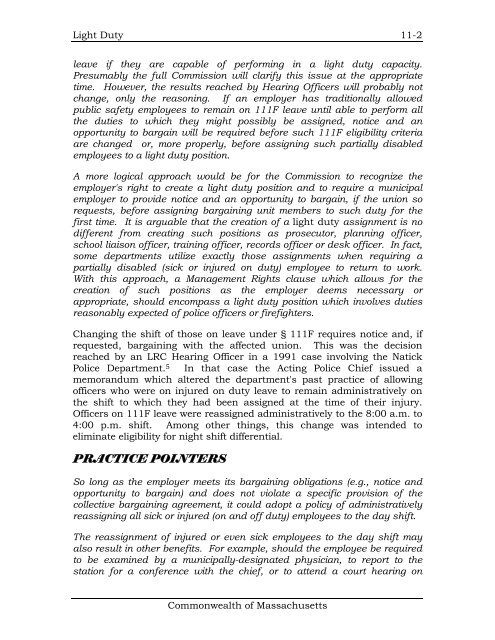Management Rights - AELE's Home Page
Management Rights - AELE's Home Page
Management Rights - AELE's Home Page
Create successful ePaper yourself
Turn your PDF publications into a flip-book with our unique Google optimized e-Paper software.
Light Duty 11-2<br />
leave if they are capable of performing in a light duty capacity.<br />
Presumably the full Commission will clarify this issue at the appropriate<br />
time. However, the results reached by Hearing Officers will probably not<br />
change, only the reasoning. If an employer has traditionally allowed<br />
public safety employees to remain on 111F leave until able to perform all<br />
the duties to which they might possibly be assigned, notice and an<br />
opportunity to bargain will be required before such 111F eligibility criteria<br />
are changed or, more properly, before assigning such partially disabled<br />
employees to a light duty position.<br />
A more logical approach would be for the Commission to recognize the<br />
employer's right to create a light duty position and to require a municipal<br />
employer to provide notice and an opportunity to bargain, if the union so<br />
requests, before assigning bargaining unit members to such duty for the<br />
first time. It is arguable that the creation of a light duty assignment is no<br />
different from creating such positions as prosecutor, planning officer,<br />
school liaison officer, training officer, records officer or desk officer. In fact,<br />
some departments utilize exactly those assignments when requiring a<br />
partially disabled (sick or injured on duty) employee to return to work.<br />
With this approach, a <strong>Management</strong> <strong>Rights</strong> clause which allows for the<br />
creation of such positions as the employer deems necessary or<br />
appropriate, should encompass a light duty position which involves duties<br />
reasonably expected of police officers or firefighters.<br />
Changing the shift of those on leave under § 111F requires notice and, if<br />
requested, bargaining with the affected union. This was the decision<br />
reached by an LRC Hearing Officer in a 1991 case involving the Natick<br />
Police Department. 5 In that case the Acting Police Chief issued a<br />
memorandum which altered the department's past practice of allowing<br />
officers who were on injured on duty leave to remain administratively on<br />
the shift to which they had been assigned at the time of their injury.<br />
Officers on 111F leave were reassigned administratively to the 8:00 a.m. to<br />
4:00 p.m. shift. Among other things, this change was intended to<br />
eliminate eligibility for night shift differential.<br />
PRACTICE POINTERS<br />
So long as the employer meets its bargaining obligations (e.g., notice and<br />
opportunity to bargain) and does not violate a specific provision of the<br />
collective bargaining agreement, it could adopt a policy of administratively<br />
reassigning all sick or injured (on and off duty) employees to the day shift.<br />
The reassignment of injured or even sick employees to the day shift may<br />
also result in other benefits. For example, should the employee be required<br />
to be examined by a municipally-designated physician, to report to the<br />
station for a conference with the chief, or to attend a court hearing on<br />
Commonwealth of Massachusetts
















